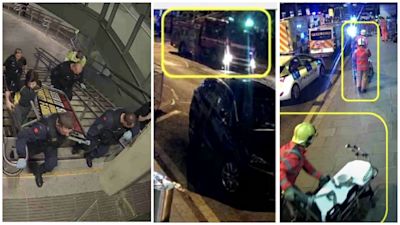Manchester Arena Inquiry: The missing blue light - where were the fire service?

When we hear a siren it’s a sign that help is on its way. But on the night of the Manchester terror attack one blue light was missing - the fire service.
It took them more than two hours to arrive at the Arena, something which shocked not just the people of Manchester but the whole nation.
So why weren’t they deployed? Well it’s a question that firefighters themselves had and one the inquiry wants to get to the bottom of.
What went wrong?
The evidence we’ve heard so far suggests it was all about communication or rather a lack of. There was confusion over whether there was an active shooter and the fire service had no one on the ground gaining a clear idea of what was going on.
The Fire Brigades Union described its officers as being ‘starved of information’ and say that’s what led to such a chaotic response.
Instead of being sent to the arena, fire crews were sent in the opposite direction to Philip’s Park fire station where they waited to be deployed- but that order never came.
Greater Manchester Police had declared Operation Plato- the pre-planned response to what they believed was a 'marauding terrorist firearms attack'.
But they didn’t inform fire and ambulance teams.
It later became clear there wasn’t an active shooter, this was a suicide bomb attack. But because the fire service was unable to get hold of the GMP force duty officer to find out for sure, fire crews were held back.
Watch manager Andrew Simister described it as a "massive decision error".
Crew manager Nicholas Mottram criticised ‘a clear lack of leadership’
Watch manager Jon Nolan described being trained to do something but not allowed to do it as ‘the worst time in my career.’
Greater Manchester Police didn't 'cover themselves in glory' during training exercises
Fire service controllers faced 'bedlam' in two hour delay sending crews to Manchester Arena
Manchester Arena bombing victims were 'denied vital assistance'
So who failed who? Was the breakdown in communication just down to the fire service being left out the loop? Or could they have done more to try and get that information?
Were senior officers 'risk averse' as some of the crews suggested?
That will be something the inquiry will need to decide.
How did firefighters feel?
‘Angry, upset and confused’ are the words one firefighter used to describe how they felt. They wanted to go and help but were held back.
When fire crews were eventually sent from Philip’s Park Fire station back to Manchester Central Fire station they were met by a ‘sea of ambulances.’ And one firefighter described being confronted by a paramedic who was crying.
Retired officer Alan Topping told the inquiry firefighters were desperate to deploy to the Arena, but 'decisions were being made elsewhere.'
In a debrief held at 4am the following day many firefighters were in tears - some were so upset they turned their backs on senior officers who couldn’t answer their questions over why they’d been stopped.
And it was this shame, anger and disappointment which left many firefighters feeling like they’d let the people of Greater Manchester down.
Would they have made a difference?
The short answer to that is yes - although how much of a difference is something the inquiry will examine.
Some specialist teams had advanced first aid kits and were carrying stretchers which could have helped carry casualties.
Instead people were moved on make shift stretchers made out of billboards and railings. And by the time fire officers did arrive more than two hours after the blast it was too late - the most seriously injured casualties had already been moved from the City Room where the bomb went off.
Whether more lives could have been saved is something the chair of the inquiry will need to consider.
We are yet to hear from some of the most senior people in the fire service, most notable the former chief Peter O’Reilly and there will almost certainly be questions over who was making those decisions and why.
MORE ON THE ARENA: